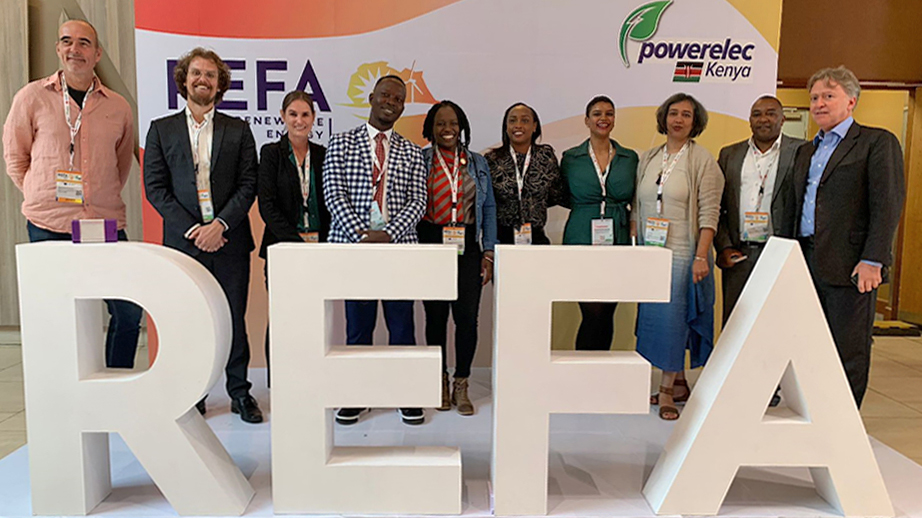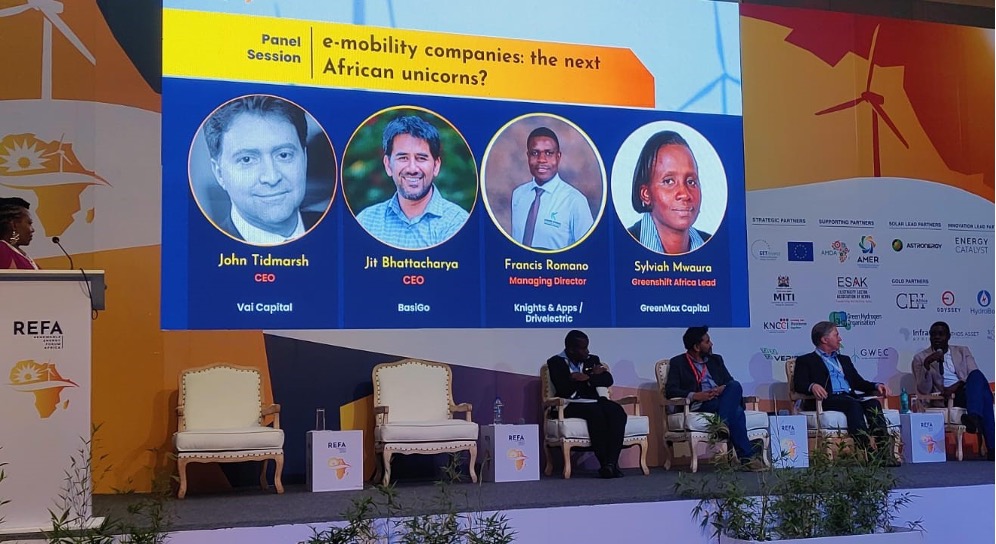Energy Catalyst companies make their mark at Renewable Energy Forum Africa 2023
The Energy Catalyst portfolio had a strong presence at this year’s Renewable Energy Forum Africa (REFA). The Nairobi-based event featured representatives from a range of Energy Catalyst-supported companies innovating in sectors such as; next-generation solar, cold chain solutions, battery and energy storage, and e-mobility.
As a supporting partner of the Forum, Energy Catalyst hosted twelve portfolio companies to enable them to make the most of the networking and knowledge-sharing opportunities: IITA; Kwame Nkrumah University of Science and Technology; MeshPower; Aptech Africa; Inclusive Energy; EnSo Trading; LENKÉ: Space & Water Solutions; Vai Capital; Saroko Technologies; Cool Lion Energies; Strathmore University; and Mobile Power.

The Forum brought together a rich network of over 300 Africa-focused institutional and private investors, project developers, policymakers, energy utilities, regulators, and corporations. Beyond the exciting exhibitions featuring the latest developments in renewable energy, a packed agenda of insightful sessions allowed for discussions across a range of hot topics, including market opportunities for green hydrogen, and financing small-scale commercial and industrial solar solutions.
While the topics covered during the event were diverse, attention often returned to the overarching question: How can we galvanise greater investment into the renewable energy systems that Africa needs to drive development and combat climate change?
Energy Catalyst was proud to support representatives from the portfolio as they offered unique perspectives from their invaluable experiences as innovators operating in complex markets. We captured some of the insights shared during the panel discussions and reflections from the forum.
The Scaling the African storage market panel featured innovative, pay-per-use battery storage company Mobile Power. Remco van Stappershoef joined the panel immediately after announcing their recent $10 million partnership with CrossBoundary Access to scale battery swapping services across Nigeria and had valuable insights to contribute to the panel discussion.
During this session, panellists grappled with the key barriers to scaling up for companies in the African energy storage market, including a lack of financing for nascent innovators, an insufficiently skilled workforce and lack of demand from consumers.
Drawing upon Mobile Power’s expertise in supplying clean power to off-grid communities through pay-as-you-go smart batteries, Remco emphasised the need for demand-driven and consumer-focused business models, noting that the energy-as-a-service companies’ operations are based around local seasonal, agricultural activities. Understanding its customer base has been crucial for Mobile Power to refine its business model, Remco further reflected, “our last-mile customers need batteries two to three times a week, not daily, so our rental model caters to that”. Given that remote communities are generally unlikely to have telecoms or internet access, Remco explained how Mobile Power has developed “apps and platforms that customers can use without the internet and mobile phones, but our battery charging hubs have internet access to allow our agents to upload data and complete transactions”. Mobile Power sees e-mobility as pivotal to the growth of the storage sector, and building on this demand, has developed a bigger battery more suited to the e-mobility market.
Investment advisory and management company, Vai Capital, whose mission is to scale deployment of low carbon road transport solutions took part in the session titled: ‘E-mobility companies: the next African unicorn?’ During the session panellists discussed the rapidly changing e-mobility sector which holds huge potential to drive economic growth in Africa. Whilst each type of vehicle, including, 2-wheelers, 3-wheelers, 4-wheelers and buses, presents its own challenges and opportunities, financing options are currently few and far between.
John Tidmarsh from Vai Capital shared insights drawn from advising and managing investment in low-carbon transport solutions. According to John, the price sensitivity in emerging African markets is critical, given that consumers are likely to acquire electric vehicles to boost their livelihoods through increased income, so business models must cater to that. However, e-mobility companies that can demonstrate key metrics, including avoided emissions as well as increased driver incomes, will help attract investors to a sector currently regarded as risky. He further stated that there is a strong need for continuing innovation in technology, financing, and business models as: “innovation is key to the sector, and must be encouraged and de-risked otherwise the sector will not evolve at the speed it must”. To that end, Vai Capital is currently developing the first dedicated fund for e-mobility innovators in Africa.

Panel sessions aside, attendees from Energy Catalyst praised the well-curated matchmaking services run by REFA, which enabled them to share more on their latest innovations with an audience of investors.
For Samuel Antwi from the Kwame Nkrumah University of Science and Technology, REFA represented “a pinnacle of my entire career as a finance and accounting professional and enabled me to make contact with so many interesting people from relevant organisations”. Meanwhile, Dhaval Bhadara from Inclusive Energy shared similar sentiments saying, “the panels were very well-organised, and I learned a lot from our industry leaders, some of whom I was able to meet”.
The conference highlighted some of the immediate challenges. While the renewable energy sector is growing steadily, the overall volume of investment is not enough and some nascent areas such as e-mobility need a rapid influx of catalytic financing to realise the true impact of the sector.
Overall, the key takeaway from REFA is that a greater scale of financing is urgently required if the renewable energy sector in Africa stands a chance of achieving SDG7 within a reasonable timeframe.
About the conference: Renewable Energy Forum Africa (REFA) is the annual conference organised by AFSIA and SolarPower Europe to promote investment in renewables on the African continent. The event is supported by GET.invest, a European programme which aims to mobilise investment in decentralised renewable energy, supported by the European Union, Germany, Sweden, the Netherlands and Austria. It took place in Nairobi, Kenya, between October 4th and 6th.